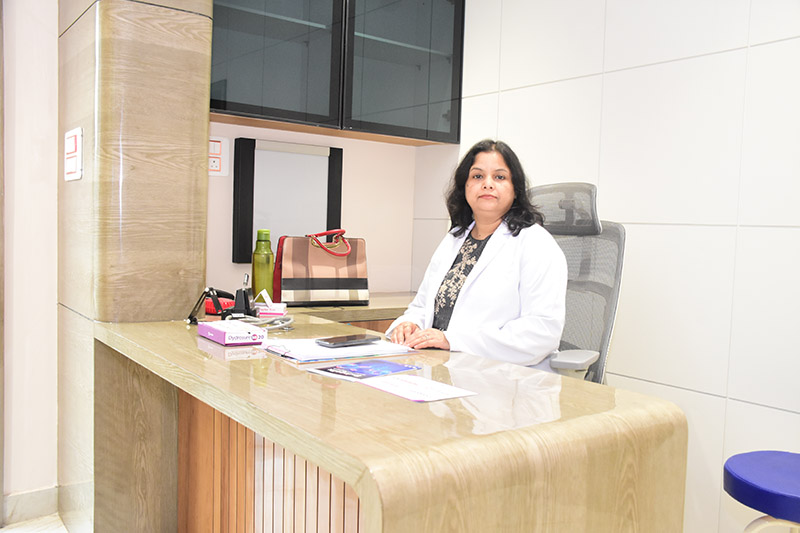About Us
Dr. Archana Kumari
Dr. Archana Kumari completed her MBBS in 2006 from Mahatma Gandhi Memorial Medical College, Jamshedpur, followed by her post-graduation in Obstetrics and Gynecology in 2012 from the same institution. She has extensive experience in managing pregnancies and conducting both normal and cesarean deliveries. Additionally, she specializes in treating couples facing fertility challenges
At sparsh clinic the team of doctors is dedicated to management of following gynecological conditions:
- Antenatal care of pregnant mothers
- Recurrent pregnancy loss
- High risk pregnancy including hypertensive disorders, oligohydramnios, gestational diabetes, fetal growth restriction
- Treatment for infertility both primary and secondary
- Disorders of menstruation like menorrhagia, oligomenorrhoea post-menopausal bleeding etc.
- Treatment of PCOD
- Management of conditions like fibroid, endometriosis, painful periods, chronic pelvic pain.
- Family planning
- Our aim is to provide quality healthcare to all expectant mothers in both antenatal and perinatal period.
(326) - 3522902

Why Choose Us?
ecological care focuses on the health and well-being of women at every stage of life. It includes the diagnosis, treatment, and prevention of conditions
100% Safe & Trusted
Sparsh clinics,100% safe and trusted for your health and wellness needs.
24/7 Take Care Staff
Providing 24x7 care with a dedicated and compassionate staff.
Medicine Service
Premier medical services tailored for your optimal health and well-being.
Doctor Category
- It is recommended to visit a gynecologist at least once a year for a well-woman checkup, which includes a pelvic exam, breast exam, and discussions about reproductive health.
- If you experience symptoms like irregular periods, pain, abnormal discharge, or unusual bleeding, you should see a doctor sooner.
- Pregnant women, those with chronic conditions like PCOS, endometriosis, or fibroids, and individuals on birth control may require more frequent visits.
Some symptoms that may indicate a gynecological issue include:
- Irregular periods (too heavy, too light, too frequent, or missed periods).
- Pelvic pain or cramps that are severe or persist outside of your period.
- Abnormal vaginal discharge (changes in color, smell, or consistency).
- Pain or bleeding during/after intercourse.
- Frequent or painful urination (could indicate infections or pelvic floor disorders).
- Unexplained weight gain or hormonal changes (could signal PCOS or thyroid issues).
- Itching, burning, or sores around the vaginal area (possible infections or STDs).
- Pap smears are used to screen for cervical cancer by detecting abnormal cells in the cervix.
- The general guidelines for Pap smear screening are:
- Start at age 21, even if you are not sexually active.
- Ages 21-29: Every 3 years if results are normal.
- Ages 30-65: Every 5 years if combined with an HPV test, or every 3 years if Pap smear alone.
- Over 65: If you’ve had several normal tests, screening may no longer be needed.
- Women with a history of abnormal Pap smears, HPV, or weakened immune systems may need more frequent screening.
Birth control options vary based on effectiveness, convenience, and individual health conditions:
- Hormonal Methods (prevent ovulation and/or thicken cervical mucus):
- Birth control pills (daily oral pill).
- Birth control patch (worn weekly).
- Birth control ring (inserted monthly).
- Birth control shot (Depo-Provera) (injected every 3 months).
- Hormonal IUD (Mirena, Skyla, etc.) (lasts 3-7 years).
- Birth control implant (Nexplanon) (lasts up to 3 years).
- Non-Hormonal Methods:
- Copper IUD (Paragard) (lasts up to 10 years).
- Barrier methods (condoms, diaphragms, cervical caps).
- Natural methods (tracking ovulation, withdrawal, fertility awareness).
- Permanent Options:
- Tubal ligation (female sterilization).
- Vasectomy (male sterilization).
- Choosing the right method depends on factors such as medical history, lifestyle, ease of use, effectiveness, and side effects. Consulting a gynecologist will help determine the best option.
- Occasional irregular periods are common, especially in teenagers, women nearing menopause, or after stopping birth control.
- However, frequent irregularity can be a sign of an underlying condition such as:
- Polycystic Ovary Syndrome (PCOS).
- Thyroid disorders (hypothyroidism/hyperthyroidism).
- Hormonal imbalances (caused by stress, excessive exercise, or eating disorders).
- Uterine fibroids or endometriosis.
- Certain medications or contraceptives.
- If your periods are irregular for several months, extremely painful, or accompanied by unusual symptoms, you should see a gynecologist for evaluation.

